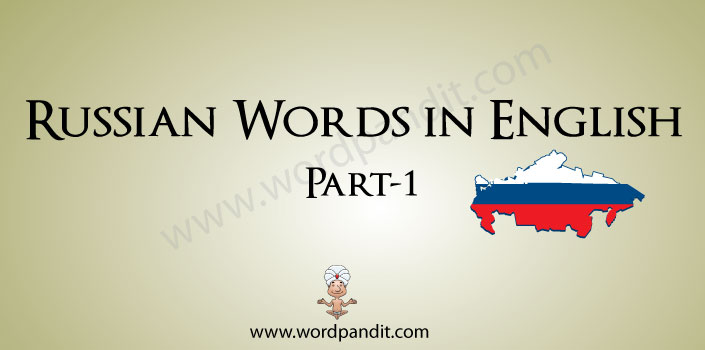 Well, we have had the food series running for quite some time. Time to introduce another series of posts, and this time we delve into the sweet sounding ‘esoteric’ words that English has imported. To begin with, we focus on words that have been imported from Russia. Yup, you heard it right: English the language has Russian imports; such is the nature of English that it effortlessly imbues any language within itself.
Well, we have had the food series running for quite some time. Time to introduce another series of posts, and this time we delve into the sweet sounding ‘esoteric’ words that English has imported. To begin with, we focus on words that have been imported from Russia. Yup, you heard it right: English the language has Russian imports; such is the nature of English that it effortlessly imbues any language within itself.
10 Russian words to begin with:
1. Agitprop: Pronounced as ‘aj-it-prop’
Agitprop means ‘Political propaganda, especially favoring communism and disseminated through literature, drama, art, or music’. In a way, it’s a truncated form derived from the words agitation and propaganda.
2. Apparatchik: Pronounced as ‘ap-uh-rat, ah-puh-raht’
This word stands for ‘A member of a Communist apparat (an organization or existing power structure, especially a political one). It is often used in a derogatory way to refer to an unquestioningly loyal subordinate, especially of a political leader or organization.
3. Babushka: Pronounced as ‘buh-boosh-kuh, -boosh-’
In Russain, this word refers to an ‘old women’. In English, it refers a woman’s head scarf, folded triangularly and worn tied under the chin, typically word by babushkas.
4. Bolshevik: Pronounced as ‘bohl-shuh-vik, bol-; Russ. buhl-shi-vyeek’
Bolsheviks were members of the left-wing majority group of the Russian Social Democratic Workers’ Party that adopted Lenin’s theses on party organization in 1903. This word is also used to refer to communists, and in disparaging terms, to people who are extreme radicals.
5. Commissar: Pronounced as ‘kom-uh-sahr, kom-uh-sahr’
According to its origin, the word is used to refer to an official of the Communist Party in charge of political indoctrination and the enforcement of party loyalty. In English, this word is used to refer to ‘a person who tries to control public opinion.’.
6. Cossack: Pronounced as ‘kos-ak, -uhk’
A member of a people of Southern European Russia and adjacent parts of Asia, noted as cavalrymen especially during czarist times.
7. Dacha: Pronounced as ‘dah-chuh’
A country house, as simple as that.
8. Glasnost: Pronounced as ‘glaz-nost, glahz‐; Russ. glahs-nuhst’
The declared public policy within the Soviet Union of openly and frankly discussing economic and political realities: initiated under Mikhail Gorbachev in 1985.
9. Gulag: Pronounced as ‘goo-lahg’
Gulags were originally a network of forced labor camps in the former Soviet Union. The word is used to a refer to a place or situation of great suffering and hardship, likened to the atmosphere in a prison system or a forced labor camp.
10. Intelligentsia: Pronounced as ‘in-tel-i-jent-see-uh, –gent-‘
Derived from the word intelligent, it is used to refer to ‘The intellectual elite of a society.’
Well, we can see from the above that the communist impact cannot be left out of these ‘Russian Words in English’.










